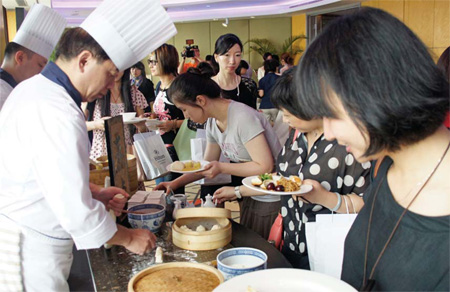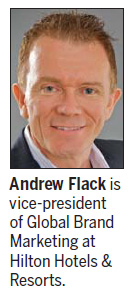A Chinese touch in hotels worldwide
Updated: 2011-12-02 09:05
By David Bartram (China Daily)
|
|||||||||
|
Reporters attend a press conference introducing Hilton Huanying, a tailored program for Chinese travellers, in September at Hilton Shanghai. The program is now available at more than 50 Hilton Hotels in 13 countries. [Provided by Hilton Hotels & Resorts] |
|
|
Hilton launches program to make visitors from Middle Kingdom feel at home
As Chinese guest numbers continue to increase in hotels worldwide, one chain is taking steps to bring a little bit of China to its guests from the Middle Kingdom.
Andrew Flack, vice-president of Global Brand Marketing at Hilton Hotels & Resorts, launched Hilton Huanying earlier this year, a program designed to offer Chinese guests a few home comforts at over 50 of the group's hotels in 13 different countries.
"We realized we had an obligation to live up to the expectations Chinese travelers were starting to carry when they traveled with Hilton. We were starting to see some consistent themes from people who were handling groups of Chinese visitors.
"They were regularly coming to our hotels and asking for things like hot water kettles in bedrooms and at least one Chinese meal a day. There came a tipping point where we needed to formalize some things that were starting to happen on a hotel by hotel basis already."
Huanying, which means welcome in Chinese, was the result. As well as kettles, slippers and a Chinese TV channel in each room, the program guarantees a Chinese speaker at the reception desk, and breakfast items such as congee and dim sum at all participating hotels. The scheme is already proving popular.
"Chinese guests have so far been very happy with it," says Flack. "We went to China in early September to launch the program there and I met the head of the Chinese Hotel Association. He told me he knew about Huanying already and had stayed in a Hilton in Hawaii. He said it was great to see real food!
"Interestingly it isn't just people coming from China who are enjoying the food. There are ethnic Chinese people who are living outside of China and even other people who just like dim sum for breakfast."
Huanying marks a watershed for Hilton as it begins a period of rapid growth focusing on both Chinese outbound tourists and the Chinese domestic market. While the company is not new to China - it opened a Shanghai hotel as far back as 1988 - slow economic growth in Europe and the US has the company turning east in search of new customers.
"China is our No 1 Asian source market now. Chinese outbound tourism is huge. A few yeas ago it started to emerge from the pack and join other major international source markets. We started to see some hotels reporting a doubling in year on year growth of Chinese visitors.
"Our top line goal is to be the preferred choice of the Chinese traveler both within China and worldwide. We're the most well known international hotel brand in China, so we're in a good place to try and live up to that goal."
To achieve such a goal, Flack understands that good service must be paired with marketing tailored specifically to China. As a result the company employs a mixed marketing strategy that combines traditional approaches with more innovative ones.
"We're using a good mix of media. We've been particularly aggressive on large billboard style advertising in high traffic public areas like shopping malls in Beijing and metro stations in Shanghai.
"But we use a lot of social media too. The online blogging community is very active in China, particularly with regard to travel. We actually sponsored five travel bloggers to travel with Hilton. They went to places like London, Australia, the Maldives, and we hosted them there. Some of these bloggers have over a million followers, so we've invested significantly in that.
"China is a society built on personal recommendation. When I travel there people always want to tell me the best restaurant or the best place to go. People want to make the right choice, so now through the Internet the capacity to give personal recommendation is particularly high in China. I'd say higher than in many other places."
Alongside this marketing strategy, Flack is also keen to stress the importance of understanding the longer game. Hilton commissions a series of research papers, known as blue papers, which explore trends in the travel sector.
A recent blue paper examined how the rise in Chinese tourism will affect the European travel industry, concluding that there is still much to be done if Europe's travel sector is to enjoy the potential benefits of the growth of Chinese outbound tourism.
"We want to stay continually in tune with the changing times, and we find that original research is one of the best ways to do that. It allows us to lead a conversation and, of course, there are big benefits to our business.
"The more we play our part in making the travel industry more effective in what it does, the better for everybody. The more people who are travelling, the better it is for airlines, the better it is for hotels and the better it is for Hilton. What we're about with the Chinese blue paper for Europe is trying to help people figure out how to make it easier for Chinese people to travel to Europe."
There are few better ways to encourage the trend than to provide good experiences to those who do travel, with a keen attention to the finer details. This is really the ethos behind Hilton's Huanying program, and one Flack believes must spread across the continent to keep Chinese tourists coming back.
"We've started Huanying in four hotels in London but in due course we expect it to spread across Europe. We have decked out the program using our Chinese team members.
"For example with the breakfast items we actually wrote menus for the preparation of the food in our Chinese hotels, and then trained hotels around the world in how to cook food the Chinese way."
It might seem a small point, but it shows how seriously multinationals take the opportunity to tap into the world's largest emerging market. It also displays the importance of local knowledge in global operations.
"If you go back to the 80s when Japanese travelers were emerging in big numbers, we had a program back then that was designed to fast-track sensitivities to Japanese travelers in key destinations around the world. We are doing a similar thing now but this time with Chinese travelers.
"It has been interesting being in Asia in recent months. Debt crises and other issues seem a long way away when you're in Shanghai because economies are still moving forward very robustly. That's one advantage of being a company in so many places - there is always somewhere in the world where you can focus on growth.
"This is really a once in a generation opportunity, where a country as dynamic as China emerges onto the world travel stage. It is absolutely our core responsibility to react to it."













